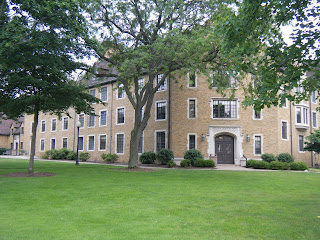Books aren't hard to acquire, but difficult to acquire cheaply. Typically, the more time you spend on looking for books, the cheaper you can get them. If you want to take the easy way out and just get everything from the bookstore, that's completely fine. Just know that you may have to pay a bit more than someone who went online and waited for their books to ship. For us bargain hunters, book buying is a kind of sport that is particularly satisfying. Observe the following conversation between the bargain hunter and the one who takes the easy way out...
It's not that it isn't easy to access books for all of your classes, in fact you can get every single book you need in the Wilson Bookstore.
(http://www.bkstr.com/Home/10001-101904-1?demoKey=d).  |
| Different ways of obtaining books |
TIP: Don't buy your books until the first week of class!
This way, you don't have to worry about moving them from home and you can determine which books you need right away and which you'll need later in the semester. The other upside is that you can check out what other students are offering, as they will often put up flyers by the mailboxes. Additionally, if you decide to change classes you don't have to go through the hassle of returning books.
Renting v. Buying
Some people prefer to rent, some prefer to buy. Personally, I go on a book-by-book basis. Usually I can find books cheaper by buying them, but if it's cheaper to rent then I'll do that. The upside to renting is that it's usually pretty cheap. The downside is that you usually have to ship stuff back yourself. If you're like me and would forget your head if it weren't attached, the late fees for letting a book sit on your desk and make friends with dust mites may not be worth it. The only time I would recommend buying and keeping books is if it's for something that you find interesting/ might potentially major in. The upside to buying the books is that, if you decide not to keep them, you can sell them back at the end of the semester either to the bookstore (which has a table in Lowry for your convenience) or to a website such as Amazon.com. There are also student representatives of Belltower Books on campus that will come to you, tell you how much your books are worth, and give you cash on the spot, which is nice.Another piece of information that a fellow student and bookstore employee pointed out is this:
"Do not rent books for classes that take 2+ semesters, such as chemistry, biology, physics, foreign languages and mathematics. In almost every case, 2 rentals will be way more then used prices + sell back. Also, the bookstore is testing a in-store rental program for newer editions, and our rental prices are about even with sites with Chegg, with the added convenience of the bookstore. Also, the Wilson bookstore has an online rental program at wooster.rentsbooks.com that has roughly equal prices with other online rental sites."
Thanks, Chris Caventer!
Wilson Bookstore
Buying Online
Personally, this is my favorite way of buying books. Not only is it typically cheaper than anywhere else, but you also get them shipped to you, which means actually getting something in your mailbox (quite a joyous event, in my humble opinion). Buying online can take some time, since you typically have to cross reference sites to get the best price, but it's worth it. You also have to consider shipping, since that can bump up the price to what you might pay at the bookstore in some cases, so use Amazon student, or buy several books from the same site to save on shipping. Textbooks.com for example will ship your books for free if the order is over $25 (excluding rentals). Don't forget about ebooks for the iPad and other tablets, as they are often even cheaper than hard copies.
The Library
Not many people utilize our library or the public library downtown for textbooks, but I believe it's one of the best ways to acquire books for classes. Granted, you may have to renew throughout the semester, and they don't always have what you need, but it never hurts to look. They usually have smaller books available, since they are more common to find in a library than textbooks. Not too many people are probably storming the public library gates to borrow From Bacon to Kant (which actually happens to be written by our very own Garret Thomson, a philosophy professor), which means that the library might be a good place to look for more obscure books. Again, the library might not always have what you need, but it never hurts to look.
 |
| Behold the Bargain Hunter! |
And now for the one and only...
Handy Dandy Step-by-Step Guide!
*Please note, this is more my personal strategy for buying books. It's not perfect I'm sure, and some people prefer to check other sites than the ones listed here, this is just a jumping-off point for those of you who may have no idea what to do.
- What books do you need?
Determine what books you need. To find lists of what you need (and how much the bookstore will charge) you can go to the Wilson Bookstore online here to figure out what books you'll need. You can worry about recommended materials later. If you have a book to buy that is particularly expensive, it never hurts to ask the prof if you have to have the newest addition, since the older editions are less expensive. Make a Word document and put the titles and ISBN numbers of the books you need next to their respective courses. This way, you can copy and paste ISBN numbers directly into wherever you're searching. - Can you get the book for free (or dirt cheap)?
As freshman, you probably won't know a lot of upperclassmen to bum books off of, but that doesn't mean you can't take a peek on your family's bookshelf or at the local used bookstore. I once found a $17 book for $3 at a local non-profit bookstore, so keep your eyes peeled around your hometown. - How much do they cost?
This is where you start the real bargain hunting. Look around online and cross-reference places like Amazon, Chegg, Textbooks.com, and Half.com to see if it's cheapest to buy, rent, or purchase an eBook. You should check the bookstore's rental and purchase prices as well, because some newer books won't have very vast price ranges and the bookstore might just be more convenient at that point. Once you've found the lowest price, put the link next to the book in to word document, and the price as well. This way, by the end of looking up all of your books you'll know how much you're going to have to shell out in all. - Purchasing
Once you know how much your books cost, you need to decide when you want to purchase them. Big books you typically need for the whole semester, but smaller books you may not use until later. Therefore, I would recommend buying books only AFTER receiving the syllabus. If you want to spread out the cost of books, you can buy them as you need them. If you would rather just not worry about it, you can purchase them all at the beginning of the semester. The first week of class you can also ask Profs questions if you can buy an older edition, or if they would be real upset if you shared a book with a friend. This is also a good time to ask how much the recommended materials are needed.
Well there you have it! If this seems overwhelming, I promise it's really not. I use a more complicated process to buy my books because I can't afford to get everything from the bookstore (my tuition is mostly covered by the government, shout out to Uncle Sam!), but the process can be very easy if you make it that way. For all of the hardcore bargain hunters out there, I wish you luck, and would LOVE for you to comment later on how cheap you were able to purchase your books :)
Happy booking!























